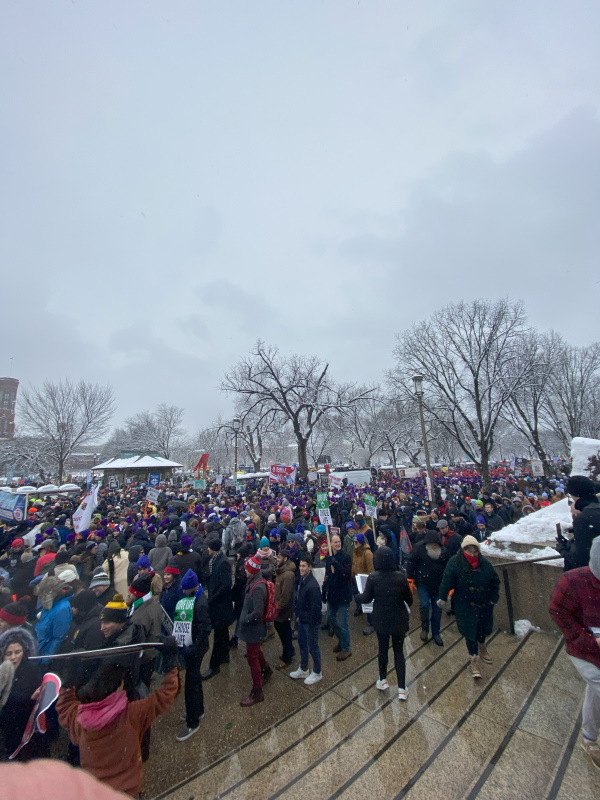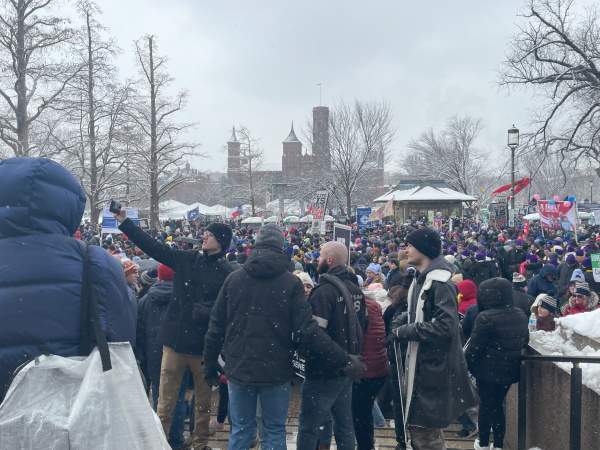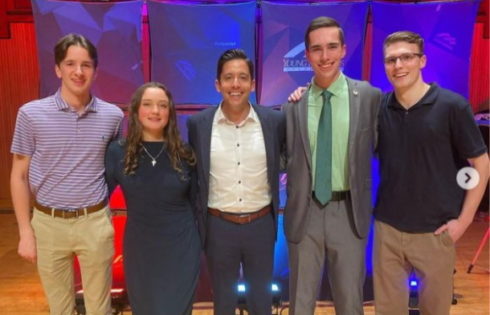
‘The emotions run high in these mountaintop moments. But the battles are won in the valleys.’
WASHINGTON, D.C. — The 2024 March for Life brought thousands into the streets of Washington D.C. on Friday amid driving wind and snow to show support for the unborn and address a pivotal question: After the overturn of Roe, where is the movement going?
Attendees gathered on the National Mall for the 51st annual rally, then marched to the Supreme Court, which in 2022 decided Dobbs v. Jackson Women’s Health, overturning Roe v. Wade and giving the decision on abortion laws up to individual states.
Tens of thousands took part in Friday’s march—far fewer than many marches in the pre-Dobbs era. Yet, the smaller turnout didn’t dampen the spirit of the event’s organizers.
“There’s a lot of you,” March for Life President Jeanne Mancini told attendees.
Among the signs peppering the crowd on Friday: “Abortion is murder,” “Gay rights starts at conception,” “Life is our revolution,” “Forceps off their bodies,” “Make more babies,” and “Let their hearts beat.” The marchers included high school and college students, families, retirees, priests, pastors and lawmakers.
The rally, preceded by a concert courtesy of American Idol finalist Danny Gokey, featured speakers ranging from legislators to cultural icons.
“This is what the heart of the pro-life movement is about: helping women and babies truly, humanly flourish,” Mancini told the audience. “We will keep marching every January until our laws offer basic protections for the unborn.”
The familiar refrain, changing hearts and minds, was mirrored in this year’s slogan: “With Every Woman, For Every Child.”
 Speakers at the rally hammered the point home: the mission of the pro-life movement in a post-Roe world is making abortion unthinkable for women, no matter their situation, and to support their decision to choose life.
Speakers at the rally hammered the point home: the mission of the pro-life movement in a post-Roe world is making abortion unthinkable for women, no matter their situation, and to support their decision to choose life.
It’s a mission that embodies the march’s big tent approach.
“It’s great to be able to have conversations with people that agree and disagree with you, including people in the movement who believe we should pursue abolitionism or incrementalism,” Liberty University senior Jesse Hughes told The College Fix.
Hughes is a history major and chairman of Liberty’s College Republicans, and he maintains that the broad approach is the right path forward.
“Being out here able to see everyone come together is a great time,” he said.
For legislators, it’s a mission tied to their core beliefs about America. House Speaker Mike Johnson (R-Louisiana), himself the product of an unplanned pregnancy, said the pro-life cause is part and parcel of America’s national creed, a creed that, in his words, “has made us the most powerful nation in the world.”
On the legislative front, Johnson highlighted several recent pieces of pro-life legislation passed by the Republican-controlled House, including the Pregnant Students’ Rights Act, aimed at helping pregnant college students find support systems for them and their child.
“Students should not have the false choice between being a student and a mother,” he said.
Rep. Chris Smith (R-New Jersey) laid out the task in very simple terms: “We reject the violence of abortion, and Dobbs conveyed the lawmaker’s power to protect life.”
Speakers hammered President Joe Biden, with Smith deeming him “the abortion president” and an architect of “extremist legislation” on the reproductive front.
But the speakers’ focus largely stayed away from the political and instead targeted the moral roots of the abortion debate.
Speakers didn’t hesitate to invoke God in their remarks, nor did attendees like Hughes.
“Any movement not grounded in faith doesn’t have a strong grounding,” he told The Fix.
 Yet, some rally attendees noted the dichotomy between the prominence of explicitly Christian messages and the movement’s desire to change hearts and minds on a broad, national scale.
Yet, some rally attendees noted the dichotomy between the prominence of explicitly Christian messages and the movement’s desire to change hearts and minds on a broad, national scale.
“The vast, vast majority of marches and prolifers are Christian and most comfortable with Christian arguments,” Princeton University junior Benjamin Woodard told The College Fix.
“It makes a lot of sense for evangelizing the pro-life cause, especially for the march. It’s targeted at people in D.C. who likely won’t change their actual beliefs about abortion.”
“Given public political pressure, they may change their policy actions.”
It’s the growth into a new identity for pro-lifers across America: as the aftereffects of Roe’s reversal reverberate nationwide, with pro-life and pro-choice Americans at close to a 50-50 proportion, how can that needle be moved on the state and local level?
For many at the march, the fight for life involves less speeches and more difficult personal changes of heart. Former NFL tight end Benjamin Watson laid out the path ahead in poignant fashion.
“The factors that drive women to seek abortions are ever increasing,” he told the audience. “With uncommon courage, we must do justice. The emotions run high in these mountaintop moments. But the battles are won in the valleys.”
MORE: Student leader’s ‘simple words of encouragement’ save baby’s life
IMAGES: For The College Fix
Like The College Fix on Facebook / Follow us on Twitter






Please join the conversation about our stories on Facebook, Twitter, Instagram, Reddit, MeWe, Rumble, Gab, Minds and Gettr.